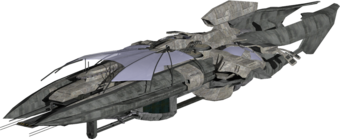
|
This wiki is closed in favour of the new wiki. Information shown is likely to be very out of date. |
Difference between revisions of "Brotherhood Shipyard"
m (Created page with "{| class="infobox bordered" style="float: right; background-color:14193F; margin-left: 1em; margin-bottom: 10px; width: 270px; font-size: 11px; line-height: 14px; border: 1px sol...") |
|||
| Line 39: | Line 39: | ||
|} | |} | ||
== History of the Brotherhood Shipyard == | == History of the Brotherhood Shipyard == | ||
| − | The Brotherhood Shipyard was a [[Zoner]]-aligned secret society of [[Freeport 1]] in [[Omega-3]]. Founded in 720 AS, they primarily discussed ways to circumvent problems that occur when designing new fightercraft. One such debate was that of fuel source, with many members supporting the traditional H-Fuel cell, while almost as many supported using MOX-based nuclear batteries. The former was a safe choice, but the latter was a large saftey risk. The MOX battery had cost roughly the same and would outlast the rest of the ship, but if destroyed it would likely shatter, and even if the shards did not puncture the pilots's ejection suit the radiation surely would. This debate left deep wounds that virtually split the society, until 3 years later | + | The Brotherhood Shipyard was a [[Zoner]]-aligned secret society of [[Freeport 1]] in [[Omega-3]]. Founded in 720 AS, they primarily discussed ways to circumvent problems that occur when designing new fightercraft. One such debate was that of fuel source, with many members supporting the traditional H-Fuel cell, while almost as many supported using MOX-based nuclear batteries. The former was a safe choice, but the latter was a large saftey risk. The MOX battery had cost roughly the same and would outlast the rest of the ship, but if destroyed it would likely shatter, and even if the shards did not puncture the pilots's ejection suit the radiation surely would. This debate left deep wounds that virtually split the society, until 3 years later someone suggested a completely modular fighter, capable of using whatever parts the pilot. This mild suggestion made in passing almost instantly healed the wounds that had been made over the years. This idea revolutionized their method of construction which was st the time only semi-modular, exclusive to the ships armament and equipment. |
Today, the Brotherhood Shipyard is an actual shipyard, a retrofitted Jinkusu-class Mobile Freeport. It has its own refineries, smelters, reprocessing plants, factories, and even shops. | Today, the Brotherhood Shipyard is an actual shipyard, a retrofitted Jinkusu-class Mobile Freeport. It has its own refineries, smelters, reprocessing plants, factories, and even shops. | ||
| + | |||
== Commodities and External Economy == | == Commodities and External Economy == | ||
{{Listbox|#47505a| | {{Listbox|#47505a| | ||
Revision as of 16:14, 17 September 2011
| Brotherhood Shipyard | |

| |
| Founder | unknown |
| Affiliation | |
| Government | Informal Bicameral Oligarchy |
| Population | 1200 men, 1800 women |
| Armament, Equipment, and Other Information | |
| Preemptive Weaponry | 2x "Battle Razor" Annihilation Cannon 2x EMP-1 Pulse Cannon |
| Defensive Weaponry | 4x ML-BB Guided Missile Launcher 6x ZDF-1 Nuclear Flak Cannon |
| Impact Rating - Hull | 1,500,000 hitpoints |
| Impact Rating - Armor | 4,000,000 hitpoints |
| Impact Rating - Shield | 460,000 hitpoints |
| Table of contents | |
History of the Brotherhood Shipyard
The Brotherhood Shipyard was a Zoner-aligned secret society of Freeport 1 in Omega-3. Founded in 720 AS, they primarily discussed ways to circumvent problems that occur when designing new fightercraft. One such debate was that of fuel source, with many members supporting the traditional H-Fuel cell, while almost as many supported using MOX-based nuclear batteries. The former was a safe choice, but the latter was a large saftey risk. The MOX battery had cost roughly the same and would outlast the rest of the ship, but if destroyed it would likely shatter, and even if the shards did not puncture the pilots's ejection suit the radiation surely would. This debate left deep wounds that virtually split the society, until 3 years later someone suggested a completely modular fighter, capable of using whatever parts the pilot. This mild suggestion made in passing almost instantly healed the wounds that had been made over the years. This idea revolutionized their method of construction which was st the time only semi-modular, exclusive to the ships armament and equipment.
Today, the Brotherhood Shipyard is an actual shipyard, a retrofitted Jinkusu-class Mobile Freeport. It has its own refineries, smelters, reprocessing plants, factories, and even shops.
Commodities and External Economy
Imports
|
Ores, Metals, Compounds, etc.
Components
FuelsGoods
|
Exports
|
Components
Weaponry |
Ships Manufactured
|
Modular
Non-Modular
|
Government
The Brotherhood Shipyard maintains an informal bicameral oligarchy. A council of regents known only by number, even to other regents, maintains all power over the course of the life of their citizens. The exception to this anonymity is Regent Zero, also known as the Chairman of the Ship. He or she is publicly known, and serves primarily to the people. Regent Zero is chosen by forum by the populace, by discussion until all qualms are settled. This is the same manner in which the Council of Regents operates. Regent Zero may also be another Regent, and as they are known by number only this is impossible to tell. Despite it being impossible to enforce, it is strictly forbidden to hold multiple regency positions, with Regent Zero being the only exception. In the event of war or emergency all power is held by Regent Zero, though the other regents maintain the power to end the state of emergency.